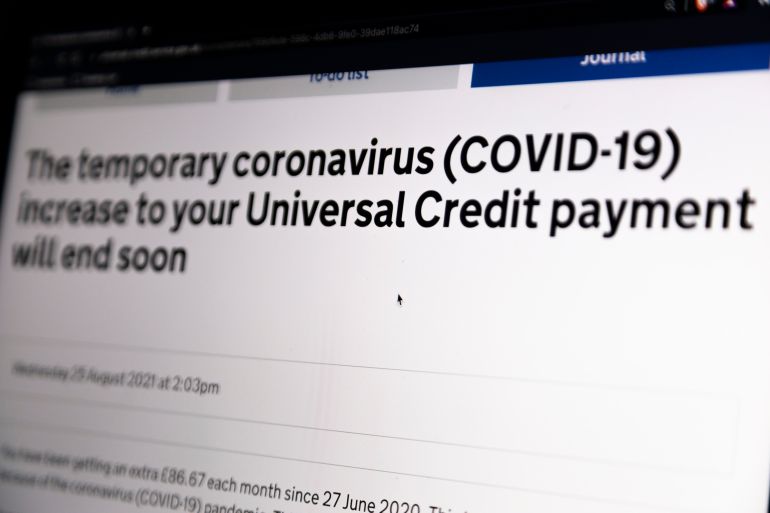UK universal credit cut: ‘We don’t know how we will survive’
A 20-pound-a-week reduction in income may not mean much to many, but for us, it is a matter of life and death.

I am fast approaching 60 and I have been disabled for many years now.
I have Ehlers-Danlos syndrome (EDS) type IV – a debilitating genetic connective tissue disorder – as well as osteoarthritis, arthritis, sleep apnea, asthma and many other conditions caused by EDS.
I used to work, but I had to stop when the pain became unbearable.
I cannot walk at all any more. I have a simple wheelchair that requires someone to push me around. My husband tries to help me move as much as he can, but it is very difficult for him – he also has mobility issues and needs a hip replacement.
I have long been trying to get myself a wheelchair with a right-hand toggle, so I can at least have some semblance of dignity. This has not yet been possible, and I do not know when – if ever – I will be able to move on my own again. Currently, I spend 99 percent of my time in bed.
As we live in the United Kingdom, a so-called welfare state, we receive several benefits from the state to make ends meet.
We have my husband’s small pension, my personal independence payment, carers allowance, and universal credit – a monthly payment for out-of-work or low-income people. On paper, this may look like more than enough money for two people to get by. But the state deducts the pension and the carers allowance from our universal credit payment. In the end, we end up with just enough money to keep a roof over our heads and some food on our table. They recently told us they made an “overpayment” about a year ago, and they are now gradually taking that back too.
It feels like they are doing everything they can to keep us at the bottom of the food chain – to keep us struggling.
In response to the COVID-19 pandemic, the government introduced a temporary 20 pounds ($27 at the current exchange rate) weekly increase to universal credit payments in early 2020.
When we heard on the news that this scheme will soon end, we did not think we had anything to worry about. We were convinced that because of all the other bits and pieces we receive, we had not been eligible for this extra payment in the first place. The amount we receive had not changed in the last year, and there had never been a mention of a “COVID-19 boost” in our payment breakdowns.
But then, out of the blue, we received a message on our online Universal Credit Journal informing us that we will be losing the COVID-19 payment. Thinking there must have been a mistake, we went over our payment breakdowns from the past year once again. Indeed, there was no mention of this payment.
Since I struggle to talk, my husband rang them and told them that we have never received any such payment. He asked them how can they take back something they did not give us in the first place. The woman on the phone told him that we have indeed been receiving this boost, and that the extra payment would stop from October.
By this time I was in tears. We average 255 pounds ($350) a month on universal credit. We borrow 200 pounds ($273.5) a month from my husband’s sister just so we can get by. Losing 20-pound-a-week, however small it may seem to others, is not something we can afford.
My husband told the woman on the phone that I was very worried, and suicidal. Her reply to that was: “Is she going to do it now?” My husband put the phone down – there was nothing left to say.
No one has since called or come to our house to check if we are OK, if I’m still alive.
Days later, our electricity supplier informed us that it will almost double our monthly electricity payments. Two of us live in a two-bed cottage – we are not running the national grid from the property.
This was the final nail in the coffin. Now, we do not know how we are going to survive. Our universal credit payments will go down next month. We will have to pay the extortionate electricity bill. We are desperate. We do not know what to do. I am still suicidal. I am struggling to find a reason to live.
I wish we did not need to claim benefits, but we do. We are ashamed to be dependent on the government, but we have both worked. We did not choose to be sick, we did not choose to be disabled. We do not drink, smoke or go out. We rescue and foster dogs, cats and hedgehogs. We do not have much, but we do our best to help animals in need.
We are not asking for much. All we want is to be treated like human beings and to live our remaining years with some dignity.
I want the government to hear our voice and understand what that 20-pound-a-week cut means to people like us – that it is a matter of life and death.
I have no wish to live like this any more.
If you or someone you know is at risk of suicide, these organisations may be able to help.
Also, in the UK and Irish Republic, contact Samaritans on 116 123 or email jo@samaritans.org.
For those bereaved by suicide in the UK, contact Survivors of Bereavement by Suicide.
In the US, the National Suicide Prevention Lifeline is 1-800-273-8255.
In Australia, the crisis support service Lifeline is 13 11 14.
Other international suicide helplines can be found at www.befrienders.org
The views expressed in this article are the author’s own and do not necessarily reflect Al Jazeera’s editorial stance.
